Insurance claim investigation is a crucial process that plays a central role in safeguarding the integrity of the insurance industry. By meticulously examining claims and uncovering potential instances of fraud or deception, investigators help insurers prevent financial losses, maintain trust with policyholders, and uphold the overall integrity of the insurance system.
Ensuring Accuracy and Fairness
Insurance claim investigation is the commitment to ensuring accuracy and fairness in the claims process. Every claim submitted to an insurance company must be thoroughly evaluated to verify its validity and legitimacy.
Investigators meticulously review claim documents, gather supporting evidence, and conduct interviews with claimants and witnesses to assess the accuracy of the claim and determine whether it meets the terms and conditions of the policy.
Detecting Fraudulent Activity
One of the primary objectives of insurance claim investigation is to detect and prevent fraudulent activity, including exaggerated damages, staged accidents, false injuries, and deliberate misrepresentations of facts. Investigators use various techniques, such as data analysis, surveillance, and forensic examination, to identify red flags and inconsistencies that may indicate fraudulent behavior.
By detecting and rejecting fraudulent claims, insurers protect themselves from financial losses and ensure that honest policyholders are not unfairly burdened with higher premiums.
Protecting the Bottom Line
Insurance claim investigation is also essential for protecting the bottom line of insurance companies. Fraudulent claims can have a significant impact on insurers’ profitability, leading to increased claim payouts, higher operating costs, and diminished profitability.
By investing in robust investigation processes and technologies, insurers can mitigate the risk of fraud and minimize losses, ultimately safeguarding their financial health and stability.
Upholding Trust and Reputation
Maintaining trust and reputation is paramount in the insurance industry. Policyholders rely on insurers to honor their commitments and provide timely and fair settlements in the event of a loss. Effective claim investigation helps reinforce this trust by demonstrating insurers’ commitment to accuracy, fairness, and ethical conduct.
By promptly investigating claims and resolving them in a transparent and equitable manner, insurers build trust with policyholders and enhance their reputation in the marketplace.
Improving Efficiency and Timeliness
Effective insurance claim investigation processes are designed to improve efficiency and timeliness in claims handling. By promptly initiating investigations and conducting thorough assessments, insurers can expedite the claims resolution process and provide timely settlements to policyholders.
Streamlining investigation procedures and leveraging technology solutions, such as automated data analysis and claims management systems, help reduce processing times and enhance customer satisfaction.
Compliance with Regulatory Requirements
Insurance claim investigation also ensures compliance with regulatory requirements and industry standards. Insurers are obligated to adhere to legal and regulatory guidelines governing claims handling practices, including the investigation of suspicious or potentially fraudulent claims.
By conducting thorough and objective investigations, insurers demonstrate their commitment to compliance and minimize the risk of regulatory penalties or sanctions. Additionally, adherence to best practices in claim investigation helps insurers maintain their licenses and accreditation, fostering trust and confidence among stakeholders.
Conclusion
Insurance claim investigation plays a vital role in protecting insurers, policyholders, and the integrity of the insurance industry as a whole. By ensuring accuracy, detecting fraud, protecting the bottom line, and upholding trust and reputation, investigators contribute to the effective functioning of the insurance system and help maintain its credibility and viability.
As fraud schemes become increasingly sophisticated, the role of insurance claim investigation will only grow in importance, serving as a critical line of defense against deception and fraud.
